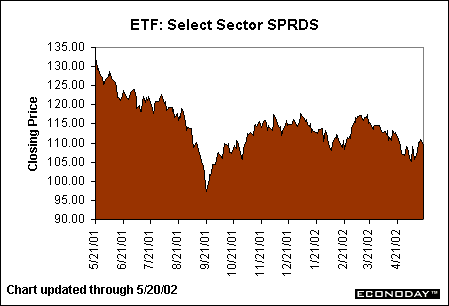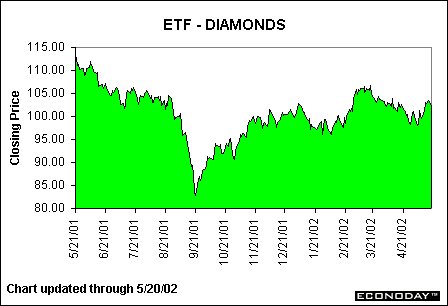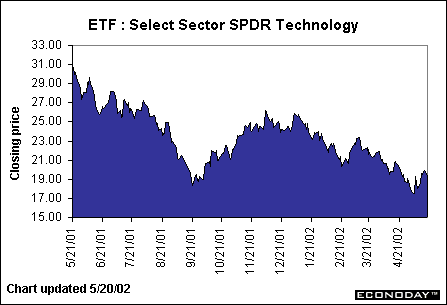Exchange traded funds offer individual investors many benefits: the combined advantages of stocks and mutual funds, lower fees, and lower capital gains taxes. In recent years, these features have helped make exchange traded funds popular, and have helped these investment vehicles emerge as one of the most flexible, multi-purpose investment vehicles available. The American Stock Exchange pioneered the concept of a tradable basket of stocks nine years ago; in recent years, exchange traded funds have evolved into a new investment category of their own. The first exchange traded fund included a basket of S&P 500 stocks, and was known as the Standard & Poor's Depositary Receipt (SPDR). In the nine years since SPDR's release, the number of exchange traded funds has grown to 100, with more growth coming in both products and in terms of assets and market value. The Financial Research Corporation predicts that the total assets invested in exchange traded funds will reach between $500 billion and $1 trillion by the year 2007.
What are Exchange Traded Funds?
Exchange traded funds (ETFs) are index funds or trusts that are listed on an Exchange and can be traded throughout the day. Investors can buy or sell shares in the collective performance of an entire stock portfolio as a single security. Exchange traded funds give investors the flexibility, ease and liquidity of trading stocks along with the benefits of traditional index fund investing.
There are 100 distinct ETFs trading on the American Stock Exchange, representing broad markets, industry sectors and international stock indices that provide vast arrays of investment opportunities. ETFs provide effective ways to invest in equity markets worldwide. Investors have the opportunity to establish long-term investments in the performance of major companies in leading industries, both in the United States and abroad. Investors can tailor their asset allocations by using diversified investments in specific industries or countries.
Advantages
There are quite a few advantages to trading in ETFs. For starters, like any index fund, they offer greater tax benefits because they generate fewer capital gains due to the low turnover of the stocks comprising the portfolio. ETFs trading costs are low. Expenses generally have a significant impact on returns for investors, and trading in ETFs gives an investor the ability to insulate oneself from the typical costs of investing in index funds, where shares need to be bought and sold to accommodate shareholder purchases and redemption.
Because ETFs are designed to (generally) replicate the holdings and correspond to the performance of their underlying index, it is easy to have a well-diversified portfolio by just buying one stock, rather than a whole slew of stocks. Also, because ETFs are exchange-traded, they can be bought and sold at intraday market prices, purchased on margin, and even sold short. For this reason, ETFs give investors the advantage of trading and tracking their fund all day, rather than at the end of the day as with index-related mutual funds.
ETFs give investors the ability to pursue a wide variety of strategies. For example, ETFs can be used as the core investment in a portfolio. The purchase of one ETF gives an investor broad stock market exposure. A diversified portfolio is easily maintained because an investor can choose particular ETFs to cover virtually every segment of the equity market.
Risks associated with ETF-investing
ETF investors are subject to the same risks as those investors who hold diversified stock portfolios. The main consideration is that stock prices may decline, thus affecting the value of an ETF. This is because an ETF represents interest in a portfolio of stocks. An exchange traded sector also may be affected by the performance of the particular sector or group of industries on which it is based.
There are some ETFs that provide the opportunity to invest in international markets, which come with their own sets of risks. International ETFs are subject to the risk of unfavorable fluctuations in currency values, differences in generally accepted accounting principles, and economic or political instability abroad. Keep in mind that these particular risks are also associated with investing directly in stocks or typical mutual funds.
Finally, there is always the risk that the ETF will not match the performance of the index or sector on which it is based. While ETFs were designed to generally correspond to the price and yield performance of their respective indices, the trusts, which manage ETFs, may not be able to replicate these performances, due to trust expenses or other factors.
Specific ETFs for investment
With 100 distinct ETFs trading on the American Stock Exchange, investors can choose to invest in a number of different ETFs that cover specific exchanges. Some of the most popular include SPDRS, DIAMONDS, and QQQ. These specific ETFs correlate to major indices, i.e. SPDRS corresponds to the S&P 500, DIAMONDS corresponds to the Dow Jones Industrial Average, and QQQ corresponds to the NASDAQ-100. A variety of ETFs cover a majority of major stock indices in the United States and abroad.
Some ETFs do not correspond to stock index averages, but to industry-specific index averages. For example, investing in the ticker symbol XLK on the American Stock Exchange gives an investor the ETF which covers the major technological companies represented in the S&P 500. Some currently popular industry-specific ETFs include iShares Dow Jones U.S. Consumers Cyclical, Select Sector SPDR Utilities, and iShares Dow Jones U.S. Utilities. These ETFs have specific ticker symbols which trade throughout the day on the American Stock Exchange.
For those looking to invest in foreign markets, some of these ETF trusts, such as the company iShares, offer the ability to not only invest in foreign indices, but also to allocate one's investments specifically to separate industries in these foreign markets.
How do ETFs perform?
To show how ETFs have performed in the past year, we will focus on three specific indexes ETFs, the ones that invest in the S&P 500, and the Dow Jones (SPDRS and DIAMONDS respectively). We will also look at an industry-specific ETF, the Select Sector SPDR Technology ETF, which corresponds to the group of technology issues trading on the S&P 500.

The S&P 500- related SPRDS ETF was the first to trade publicly. It has generally followed the market, with the largest declines being near the September 11th attacks. However, it is interesting to note that the price of this ETF still trades in a tight range, while if one were to invest in an S&P 500 Index Mutual Fund, one would have seen greater losses.

The DIAMONDS ETF encompasses the 30 major stocks trading on the Dow Jones Industrial Average. We can see that this ETF trades similarly to the SPRDS ETF above, although it is interesting that one can buy the DIAMONDS ETF at a lower price. Because the Big Board is being represented, one might have expected that the DIAMONDS ETF would be the most expensive to trade in.

The above chart shows the performance of the Select Sector SPDR Technology ETF over the past year. This ETF is directly correlated to a portfolio of stocks directly correlated to technology companies trading on the S&P 500. In comparison to the index-related ETFs, one can see that the industry related ETFs are both cheaper and show more volatility in the past year.
What does all this mean for investors?
Exchange-traded funds offer worthwhile opportunities for the everyday investor. Economists, financial analysts, fund managers, and other investment specialists all agree that an investor's portfolio should be well-diversified. Trading in ETFs is an easy way to take advantage of the movement of financial markets with the purchase of just one "stock".
ETFs have a large following among investors, and their popularity will continue to grow. The advantages of trading a single security that gives you the diversification and performance of an entire stock index more than outweigh the risks, which are the same as investing in any individual stock or mutual fund.
Damir Fonovich, Market Analyst, Econoday
| ![[Back To Archive]](../../../images/backtoarchive.gif)
